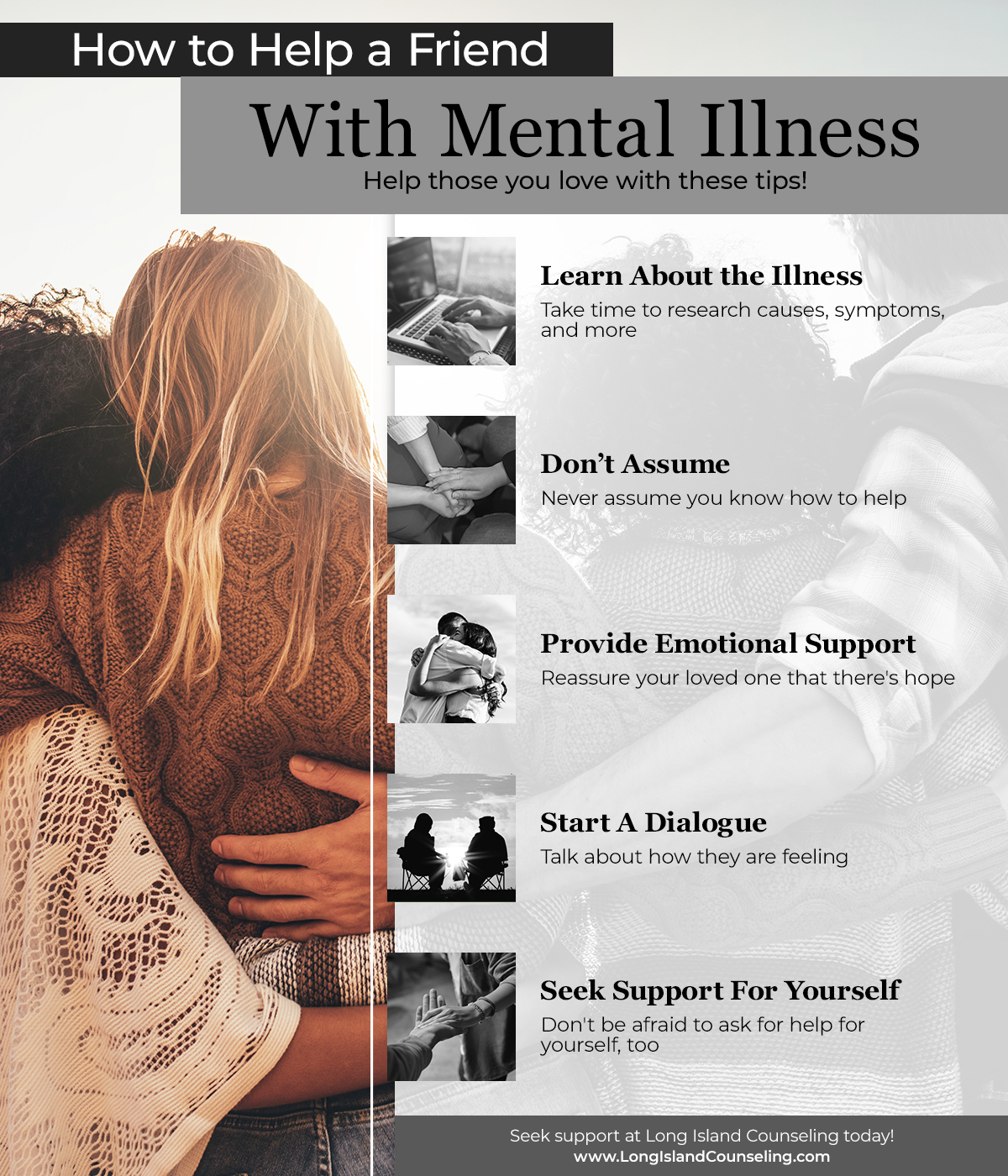How to Help a Friend With Mental Illness


Mental illness affects many people, and even those who don’t experience mental illness themselves still may know or have someone in their life who is experiencing a mental health problem. That being said, if you have someone in your life who is dealing with anxiety, depression, or another mental health condition, you may be wondering how you can help. If you’ve never personally dealt with mental illness, you might not know what your friend needs. While mental illness affects everyone differently, in today’s post we will discuss some of the basic things you can do to help a friend or loved one during a difficult time.
If you or someone you know is living with mental illness, Long Island Counseling is here to help. We offer individual counseling services for those experiencing depression, anxiety, eating disorders, substance abuse, and more. In addition to our individual counseling services, we also offer couple’s counseling to help you and your partner work through problems in your relationship. Regardless of your reason for attending counseling, we are here to provide you with the tools and support you need to overcome and manage your mental illness. Explore our website to learn more, and contact Long Island Counseling to request an appointment today!

Learn About the Illness
The first thing you should do when you learn that your loved one is experiencing mental illness is to research the illness. While you may not be able to completely understand what the other person is experiencing, conducting research on the illness and learning more about potential causes or symptoms can give you a better idea of how you can help. For example, if your loved one is living with anxiety, and they experience an anxiety attack, doing your research will help you learn what tricks and techniques can help your loved one calm down during an attack. Additionally, having a better understanding of the mental health condition may also give you the feeling that you’re doing something, even if you’re not helping them directly at the time.
Don’t Assume
After conducting your research, you may think you know a lot about the mental health condition your loved one is experiencing. However, it’s important to note that not everyone experiences mental illness in the same way, even if two people are experiencing the same condition. With that in mind, you should never assume you know exactly how to help your loved one. Instead, it’s better to ask your friend or loved one how they would like you to support them. When you ask what you can do, it’s equally as important that you pay close attention and listen to the answer. If you don’t listen or respect their wishes, it could make the problem worse.
Provide Emotional Support
In many cases, mental illness can leave people feeling ashamed and alone, as a part of their support system, it’s on you to provide them with emotional support when it’s needed. Do your best to reassure your friend that they aren’t alone and encourage hope. Those experiencing mental illness may not be very receptive to your support, so it’s also important that you practice patience and understanding.
Start a Dialogue
Sometimes the best thing you can do for your friend or loved one is to start a dialogue. There are some who experience mental illness but don’t believe there is anything wrong. In instances such as this, talking about why they feel that way or what they are experiencing can be extremely beneficial. Even if your friend understands that they are experiencing a mental health condition, they may have a hard time talking about it. Do your best to start an open, honest, and health conversation so that your friend knows they are in a safe space.
Seek Support for Yourself
Not only can experiencing a mental illness be difficult on the individual, but it can also have an effect on the support system. Trying to practice patience and understanding while also being supportive can be exhausting and emotionally draining. The last thing you want is to lead your friend or loved one to believe you don’t care just because you need a break. Instead, consider seeking support for yourself.
Counseling can be extremely beneficial for all people, even those who don’t personally experience a mental health condition. Everyone needs to feel supported, and if you need a little extra support, seeking help from a therapist is a great way to go!
Contact Long Island Counseling Today!
If you or someone you know is experiencing mental illness, the individual counseling services at Long Island Counseling can be a great resource to help you live a fuller, happier life. We all need a little support every once in a while, whether you’re seeking individual counseling services or couple’s counseling. If you are interested in learning more, or you would like to schedule an appointment, contact Long Island Counseling today!
Contact Us
Long Island Counseling
Long Island Counseling
Lisa Lempel-Sander LPsyA
Licensed Psychoanalyst
221 Hollywood Ave
Douglaston NY 11363
Contact Us Today!

Couples & Marriage Counseling
Professional marriage counseling and couples therapy helps heal after an affair or infidelity, helps build trust and improve communication, helps resolve arguments about money or sex, and teaches you what each needs to promote intimacy and emotional connection. For all couples looking to strengthen their relationship.

Anxiety & Depression
Therapy provides support and direction in overcoming addiction and substance abuse, in resolving anxiety, depression and other emotional pain including lack of confidence and low self-esteem. Therapy helps with clarifying sexual orientation, gender-based identity questions, LGBT issues, gay and lesbian questions.

Relationship In Crisis
Discernment Counseling has one goal: to help you decide whether to stay in the relationship and try to work it out, or to leave. Discernment Counseling treats both partners even when there’s disagreement about the desired outcome. Discernment Counseling is a brief, highly-focused protocol with just one goal: helping you decide.

